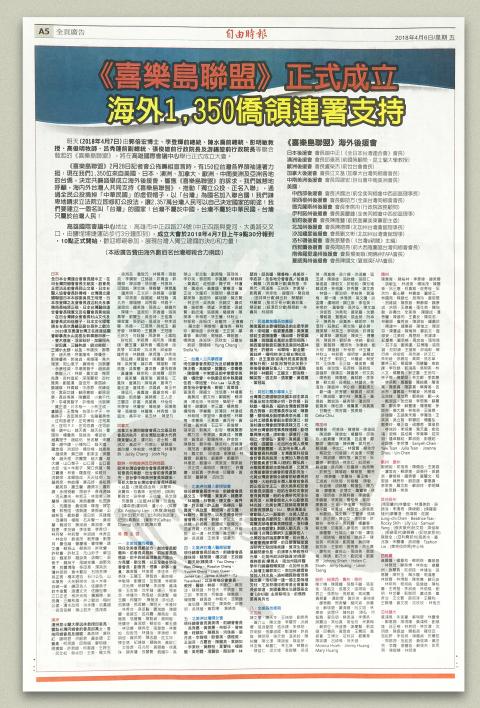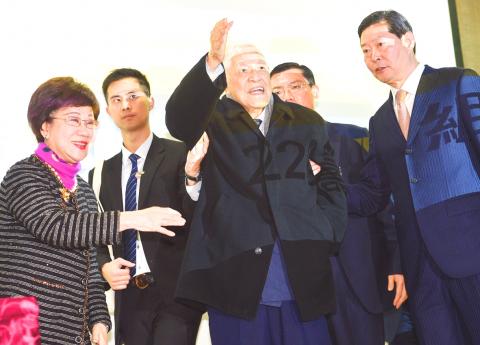Overseas supporters of the Formosa Alliance’s (喜樂島聯盟) proposal for an independence referendum and the nation’s participation in the UN under the name “Taiwan” yesterday ran a full-page newspaper advertisement in Taiwan announcing their support.
The advertisement in the Chinese-language Liberty Times (sister newspaper of the Taipei Times) printed the names of 1,350 leaders of overseas Taiwanese groups who support the alliance’s appeals, including All Japan Taiwanese Union president Chao Chung-cheng (趙中正), Taiwanese Canadian Association of Toronto president Douglas Chiang (江文基), Taiwanese Association of America president Cheng Shao-fang (鄭劭方) and former World Federation of Taiwanese Associations Europe chapter president Lu jung-chieh (盧榮杰).
Formosa TV (FTV, 民視) chairman Kuo Pei-hung (郭倍宏) on Feb. 28 announced plans for the alliance’s establishment along with politicians who support Taiwanese independence, including former president Lee Teng-hui (李登輝), former president Chen Shui-bian (陳水扁) and former vice president Annette Lu (呂秀蓮).

Photo: Taipei Times
The alliance has called for amendments to the Referendum Act (公民投票法) and is pushing for an independence referendum on April 6 next year, as well as Taiwan’s inclusion in the UN under the name “Taiwan.”
When the alliance announced its declaration in February, it had the support of 150 leaders from different fields in Taiwan, the advertisement said.
Now, 1,350 Taiwanese living in the US, Japan, Australia, Canada, Europe, Central and South America and different parts of Asia are to participate in the movement by establishing overseas alliance supporters’ groups in response to the alliance’s appeals, it said.

Photo: Peter Lo, Taipei Times
Taiwanese in Taiwan and overseas are urged to support the alliance and pass a referendum to remove the false label that is the “Republic of China,” the advertisement said.
Separately yesterday, Kuo said that now is the best time for Taiwan to call for independence, as the international community, the US and Japan are all very friendly toward the nation.
Taiwan should put in some effort, use the referendum to remove the Republic of China (ROC) label and stop using names like “Chinese Taipei,” he said.
Since the Referendum Act does not allow for a change to Taiwan’s sovereignty and territory, the alliance proposes that the Legislative Yuan amend the act immediately and allow 23.57 million Taiwanese to decide the future of the nation, Kuo added.
“Taiwan belongs to neither China nor the ROC; Taiwan only belongs to Taiwanese,” he said.
The alliance is to be officially launched in Kaohsiung today, the 29th anniversary of the death of democracy activist Deng Nan-jung (鄭南榕), who died when he set himself on fire in defense of “100 percent freedom of expression.”
Additional reporting by Su Fang-ho

CHAOS: Iranians took to the streets playing celebratory music after reports of Khamenei’s death on Saturday, while mourners also gathered in Tehran yesterday Iranian Supreme Leader Ayatollah Ali Khamenei was killed in a major attack on Iran launched by Israel and the US, throwing the future of the Islamic republic into doubt and raising the risk of regional instability. Iranian state television and the state-run IRNA news agency announced the 86-year-old’s death early yesterday. US President Donald Trump said it gave Iranians their “greatest chance” to “take back” their country. The announcements came after a joint US and Israeli aerial bombardment that targeted Iranian military and governmental sites. Trump said the “heavy and pinpoint bombing” would continue through the week or as long

TRUST: The KMT said it respected the US’ timing and considerations, and hoped it would continue to honor its commitments to helping Taiwan bolster its defenses and deterrence US President Donald Trump is delaying a multibillion-dollar arms sale to Taiwan to ensure his visit to Beijing is successful, a New York Times report said. The weapons sales package has stalled in the US Department of State, the report said, citing US officials it did not identify. The White House has told agencies not to push forward ahead of Trump’s meeting with Chinese President Xi Jinping (習近平), it said. The two last month held a phone call to discuss trade and geopolitical flashpoints ahead of the summit. Xi raised the Taiwan issue and urged the US to handle arms sales to

BIG SPENDERS: Foreign investors bought the most Taiwan equities since 2005, signaling confidence that an AI boom would continue to benefit chipmakers Taiwan Semiconductor Manufacturing Co’s (TSMC, 台積電) market capitalization swelled to US$2 trillion for the first time following a 4.25 percent rally in its American depositary receipts (ADR) overnight, putting the world’s biggest contract chipmaker sixth on the list of the world’s biggest companies by market capitalization, just behind Amazon.com Inc. The site CompaniesMarketcap.com ranked TSMC ahead of Saudi Aramco and Meta Platforms Inc. The Taiwanese company’s ADRs on Tuesday surged to US$385.75 on the New York Stock Exchange, as strong demand for artificial intelligence (AI) applications led to chip supply constraints and boost revenue growth to record-breaking levels. Each TSMC ADR represents

State-run CPC Corp, Taiwan (CPC, 台灣中油) yesterday said that it had confirmed on Saturday night with its liquefied natural gas (LNG) and crude oil suppliers that shipments are proceeding as scheduled and that domestic supplies remain unaffected. The CPC yesterday announced the gasoline and diesel prices will rise by NT$0.2 and NT$0.4 per liter, respectively, starting Monday, citing Middle East tensions and blizzards in the eastern United States. CPC also iterated it has been reducing the proportion of crude oil imports from the Middle East and diversifying its supply sources in the past few years in response to geopolitical risks, expanding